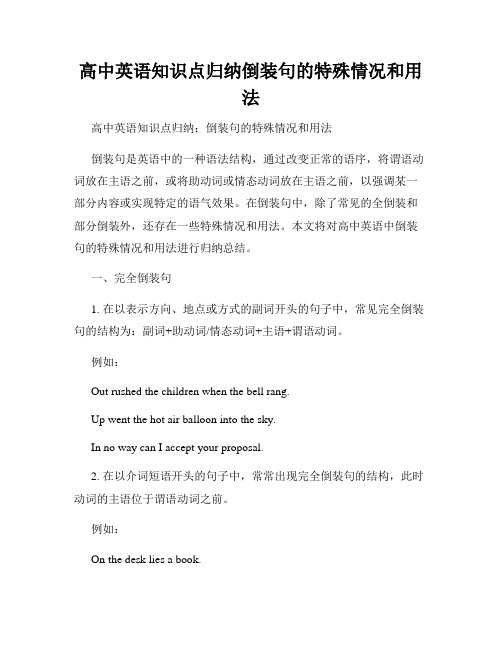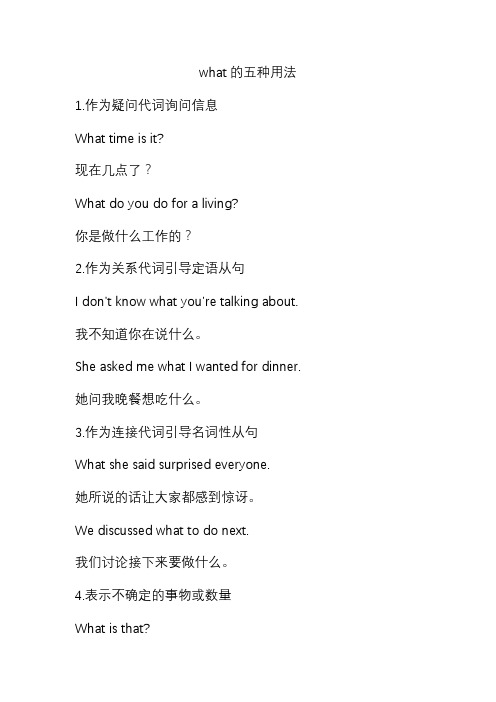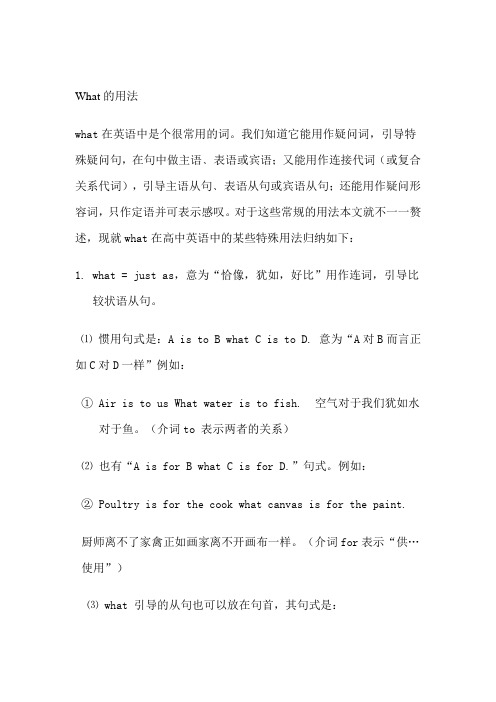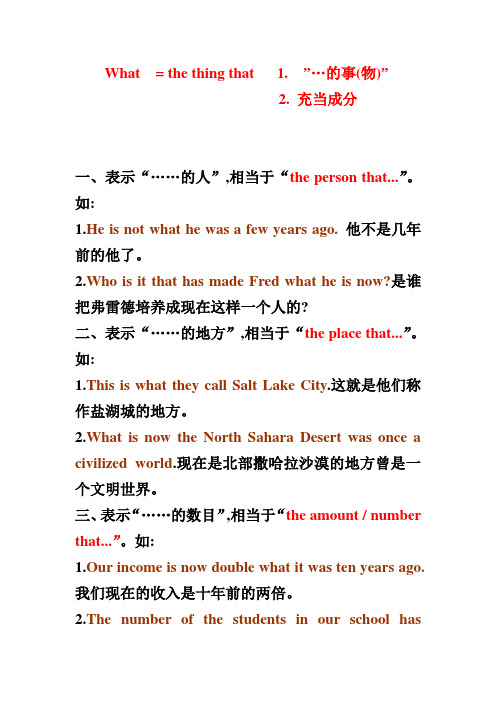what在高中英语中的某些特殊用法
高中英语知识点归纳倒装句的特殊情况和用法

高中英语知识点归纳倒装句的特殊情况和用法高中英语知识点归纳:倒装句的特殊情况和用法倒装句是英语中的一种语法结构,通过改变正常的语序,将谓语动词放在主语之前,或将助动词或情态动词放在主语之前,以强调某一部分内容或实现特定的语气效果。
在倒装句中,除了常见的全倒装和部分倒装外,还存在一些特殊情况和用法。
本文将对高中英语中倒装句的特殊情况和用法进行归纳总结。
一、完全倒装句1. 在以表示方向、地点或方式的副词开头的句子中,常见完全倒装句的结构为:副词+助动词/情态动词+主语+谓语动词。
例如:Out rushed the children when the bell rang.Up went the hot air balloon into the sky.In no way can I accept your proposal.2. 在以介词短语开头的句子中,常常出现完全倒装句的结构,此时动词的主语位于谓语动词之前。
例如:On the desk lies a book.Under the bridge flows a river.二、强调句型倒装句常用于强调句型,通过改变正常语序,将被强调的部分提前至句首,以突出重要信息。
1. It is/was + 被强调部分 + that/who + 句子其余部分。
用于强调句子的主语、宾语、地点、时间等。
例如:It is Jane who won the singing competition.It was at the park where they met for the first time.It was yesterday that I finished reading the book.2. What/How + be 动词 + 主语 + 谓语动词 + 其他成分。
用于强调句子的母语、宾语、状语等。
例如:What I want is a peaceful world.How beautiful the sunset is!How hard he works!三、倒装句用于祝愿句和条件句1. May/Should + 主语 + 谓语动词.May you have a wonderful journey!Should you need any assistance, feel free to contact us.2. If + should/ were + 主语 + 谓语动词.If it should rain tomorrow, we will cancel the outdoor activity.If I were you, I would apologize to him.四、疑问句的倒装在一般疑问句中,主语和助动词/情态动词倒装。
(完整版)高中英语代词的用法

代词一、定义与分类代词是代替名词及起名词作用的短语或句子的词。
代词根据其意思和用法可分为人称代词、物主代词、反身代词、指示代词、相互代词、疑问代词、连接代词、关系代词、不定代词九类。
综观历年高考情况,在这九类代词中,不定代词一直是高考英语的重点。
⏹人称代词I , you ,she ,him⏹疑问代词who, whom, whose, which, what (用于引出特殊疑问句的代词)注意:what与which的用法区别:当选择的范围较明确时,用which;不明确时用what。
如:Which color do you like, red, black or white? What color is your car?⏹物主代词my 、your、hers⏹关系代词which 、that、who、whom⏹反身代词myself、yourselves注意:反身代词用于be, feel, seem, look 等后作表语表示身体或精神所处的状态。
如:I'll be myself again in no time. 我一会儿就会好的。
He doesn't feel himself today.I’m not quite myself these days. 我近来身体不大舒服。
⏹连接代词who, whom, what, which, whose, whoever, whatever, whichever主要用于引导主语从句、宾语从句和表语从句等⏹相互代词each other、one another⏹不定代词one、each、another、neither⏹指示代词this、that、those、these注意:a. 为避免重复,可用that 和those 代替前面提到的名词。
如:The playground of this school is bigger than that of that school.(that=the playground)My books are next to those of the monitor.b. 在打电话时,通常用this 指自己,用that指对方:如:Hello. This is Jim. Is that John?c. this 和that 还可用作副词,用以修饰形容词或副词,意为“这么”、“那么”,相当于so。
what的五种用法

what的五种用法1.作为疑问代词询问信息
What time is it?
现在几点了?
What do you do for a living?
你是做什么工作的?
2.作为关系代词引导定语从句
I don't know what you're talking about. 我不知道你在说什么。
She asked me what I wanted for dinner. 她问我晚餐想吃什么。
3.作为连接代词引导名词性从句
What she said surprised everyone.
她所说的话让大家都感到惊讶。
We discussed what to do next.
我们讨论接下来要做什么。
4.表示不确定的事物或数量
What is that?
那是什么?
I'll eat whatever you're having. 我吃你吃的那个。
5.表示强调或感叹
What a beautiful day it is!
今天天气真好!
What nonsense!
胡说八道!。
高中英语:特殊句式语法总结

高中英语:特殊句式语法总结用来表示说话人强烈的喜、怒、哀、乐等感情的句子,叫感叹句。
感叹句由what 或how引导,具体用法如下表:感叹句记忆口诀:感叹句,并不难,what与how应在前。
形容词、副词跟着how,what后面名词连。
名词若是可数单,前带冠词a或an。
主词、谓语放后面,省略它们也常见。
祈使句的基本用法祈使句是用来表示命令、请求、建议或劝告等的句子。
常省略主语,谓语动词用原形。
1. 肯定的祈使句①句型:动词原形+其他成分。
Be careful!小心!②"Do+祈使句"表示一种强烈的感情或请求,do起强调作用。
③please用在祈使句中可以表示一种客气的语气,但please用在句末时,必须用逗号与其余部分隔开。
Close the door, please. 请关门。
2. 否定的祈使句①常用句型:Don’t+动词原形+其他成分。
Don’t be late for school again! 别再迟到了!②用Never开头:Never+动词原形+其他成分。
Never leave today’s work for tomorrow! 不要把今天的工作留到明天!3. Let引导的祈使句以Let开头的句子也是祈使句,表示陈述和建议。
其否定形式有两种:Let...not 或Don’t...Let us not be late. 让我们不要迟到。
Don’t let the boy play football in the street. 不要让这个男孩在街上踢足球。
祈使句与简单句、复合句之间的转换1. "Let’s + 动词原形 + 其他"可转换为"Shall we + 动词原形 + 其他? "。
Let’s go fishing thi s afternoon. =Shall we go fishing this afternoon?2. "祈使句 + and/or + 简单句"可转换为含if引导的条件状语从句的复合句。
2023年高中英语语法:名词性从句用法详解及强化练习分析

2023年高中英语语法:名词性从句用法详解及强化练习分析名词性从句分类简述名词性从句,就是指其作用相当于名词的从句,它包括主语从句、表语从句、宾语从句和同位语从句。
一、主语从句1. 引导词:主语从句就是在复合句中用作主语的从句,引导主语从句的引导词主要有三类:一是that;二是whether;三是那些可以用作疑问词的词语,如what, who, which, when, where, how, why 等。
如:That we shall be late is certain. 我们要晚了,这是确定无疑的。
What he says is not important. 他说的话并不重要。
Whether it will do us harm remains to be seen. 是否对我们有害还要看一看。
2. 形式主语:有时为了避免句子显得“头重脚轻”,可用it作形式主语放在句首,而把真正的主语放在句末。
如:It’s a pity that he didn’t come. 很遗憾他没来。
It was uncertain whether he could come or not. 他是否会来还不肯定。
这三句句首的it均为形式主语,相应的真主语分别是that he didn’t come / what she did / whether he could come or not。
二、表语从句表语从句就是在复合句中用作表语的从句。
一般说来,可用于引导主语从句的引导词也可用于引导表语从句,如that, what, who, which, when, where, how, why, whether等。
如:My idea is that we should do it right away. 我的意见是马上就干。
That is what he meant. 这就是他的意思。
The problem is how we can find him. 问题是我们如何找到他。
What的用法

一半由于工作过度的劳累,一半由于睡眠不足,她病倒了。
④ She has been depressed,what with losing her job and having to move.
What C is to D,that A is to B.(= A is to B what C is to D.)
在这一结构中,喻体在前,主体在后,相当于“just as…,so…”结构,意思也是“A对B而言正如C对D一样”例如:
What blood vessel is to a man’s body,that railway is to transportation.(=Just as blood vessel is to a man’s body ,so Railway is to transportation.)
① What do you think of the idea?你认为这个主意怎样?
② What did you think of that film?你对那场电影评价如何?
注意:“ What do you think of…?”是惯用搭配,不能改为“How do you think of…?”。但我们可以说:How do you feel about the idea(that film)?或者How do you like the idea(that film)?
7. what从句可用作宾语补足语或状语。例如:
① We will make the factory twice what it is today.
我们将使工厂比现在规模增加一倍。(句中的twice what it is today是动词make的宾语the factory的补足语)
what的用法总结大全

what的用法总结大全what的用法你知道多少,今日我给大家带来what的用法,盼望能够关心到大家,下面我就和大家共享,来观赏一下吧。
what的用法总结大全what的意思pron. (用以询问某人或某事物的词)什么,多少,…的事物adj. …的(事物或人)adv. (用于感叹句中)int. (用以表示不信任或惊异),(用以表示未听清晰对方说的话)what用法what可以用作代词what用作疑问代词时,其基本意思是“什么,什么东西,什么事情”,用作疑问句,为特别疑问句的一个标志。
what作关系代词时,其含意是“所…的事(物)”。
可用来引导主语从句,表语从句,宾语从句或同位语从句。
当引导主语从句,其所指的名词必定是单数。
主语是单数时,谓语动词一般是单数,但有时因谓语动词之后有复数名词,谓语动词也可用复数; what引导宾语从句时,常置于谓语之后,用作表语时,放在系动词之后。
what还可引导让步状语从句,意思是“不管…”。
还可接动词不定式短语。
what有时候可解释为whatever,表示“不管怎么样”。
I gave him what help I could. 我给他任何我能给的关心。
what用作代词的用法例句What are you having for dinner?你晚饭吃什么?She is not what she was a few years ago.她已经不是几年前的她了。
What color is your dress?你的衣服是什么颜色?what用法例句1、For what do we live, but to make sport for our neighbours, and laugh at them in our turn?我们活着是为了什么?不就是给邻居当笑柄,再反过来笑他们。
2、Instead of complaining about whats wrong, be grateful for whats right.别埋怨不好的事,要对好的事心存感恩。
what 的特殊用法及that的区别

What = the thing that 1. ”…的事(物)”2. 充当成分一、表示“……的人”,相当于“the person that...”。
如:1.He is not what he was a few years ago.他不是几年前的他了。
2.Who is it that has made Fred what he is now?是谁把弗雷德培养成现在这样一个人的?二、表示“……的地方”,相当于“the place that...”。
如:1.This is what they call Salt Lake City.这就是他们称作盐湖城的地方。
2.What is now the North Sahara Desert was once a civilized world.现在是北部撒哈拉沙漠的地方曾是一个文明世界。
三、表示“……的数目”,相当于“the amount / number that...”。
如:1.Our income is now double what it was ten years ago.我们现在的收入是十年前的两倍。
2.The number of the students in our school hasreached as many as 20,000, ten times what it was before liberation.现在我校学生多达2万人,是解放前的十倍。
what的这种特殊含义可以根据句子的意思在翻译时灵活处理,不可千篇一律。
再如:1. Shenzhen is no longer what it was in the past.深圳不再是过去那样子了。
(what=the city that)2. The color of the flower is different from what it was in the morning.花朵的颜色与早晨的不同。
- 1、下载文档前请自行甄别文档内容的完整性,平台不提供额外的编辑、内容补充、找答案等附加服务。
- 2、"仅部分预览"的文档,不可在线预览部分如存在完整性等问题,可反馈申请退款(可完整预览的文档不适用该条件!)。
- 3、如文档侵犯您的权益,请联系客服反馈,我们会尽快为您处理(人工客服工作时间:9:00-18:30)。
what在高中英语中的某些特殊用法
what在英语中是个很常用的词。
我们知道它能用作疑问词,引导特殊疑问句,在句中做主语﹑表语或宾语;又能用作连接代词(或复合关系代词),引导主语从句﹑表语从句或宾语从句;还能用作疑问形容词,只作定语并可表示感叹。
对于这些常规的用法本文就不一一赘述,现就what在高中英语中的某些特殊用法归纳如下:
1. what = just as,意为“恰像,犹如,好比”用作连词,引导比较状语从句。
(见新编高二英语上册p.21)
⑴惯用句式是:A is to B what C is to D. 意为“A对B而言正如C对D一样”例如:
① Air is to us What water is to fish. 空气对于我们犹如水对于鱼。
(介词to 表示两者的关系)
⑵也有“A is for B what C is for D.”句式。
例如:
② Poultry is for the cook what canvas is for the paint. 厨师离不了家禽正如画家离不开画布一样。
(介词for表示“供…使用”)
⑶ what 引导的从句也可以放在句首,其句式是:What C is to D,that A is to B.(= A is to B what C is to
D.)
在这一结构中,喻体在前,主体在后,相当于“just as…,so…”结构,意思也是“A对B而言正如C对D 一样”例如:
What blood vessel is to a man's body,that railway is to transportation.(=Just as blood vessel is to a man's body ,so Railway is to transportation.)
铁路对于运输,好比血管对于人体一样。
2. what 与do with连用,意为“(怎样)处理﹑安排或对付等”。
what常有较灵活的翻译,常用结构是:“what …do with sth./sb.?”或“what to do with sth./sb.” 例如:
① What will you do with the letter?你将把那封信怎样处理?
② The kids do not know what to do with themselves on rainy days.
孩子们不知道雨天干什么好。
注意:do with 与deal with同义,但搭配不同:do with只能与what搭配,而deal with可与不同的疑问词搭配。
比较:
③ How will you deal with the letter?你将那封信怎样处理?
④ You may have some idea of what the astronauts have to deal with if you try to drink a glass of water while standing on your head or while just lying down.
如果你试着倒立着或仅以躺着的姿势去喝水,就能大致体会得到宇航员必须应付什么了。
3. 问价格﹑度量﹑速度、人口﹑面积﹑门牌(汽车﹑电话等)号码等时,只能用what提问,不能用how much提问。
例如:
① What is the cost(price)of the gold watch?这块金表多少钱?
② What is the speed of the car?车速是多少?
③ What is the length(width﹑depth)of the lake?这湖有多长(宽、深)?
④ What is the population(area)of China?中国的人口(面积)有多少(大)?
⑤ What money(cash)have you got?你有多少钱(现金)?
⑥ What is your telephone (car、room)number?
你的电话(汽车﹑房间)号码是多少?
4.“What is …like?”的两种含义。
⑴表示“情况怎样”,多指天气或气候。
例如:
①What is the weather like today?今天天气怎样?
②What is the climate like there?那里的气候怎样?
⑵表示“像什么样,什么模样,怎样的” 指人或事物。
例如:
③What is the camel like ?骆驼是什么样子的?
④— What is your teacher like?— She is very kind and beautiful.
“你老师是怎样一个人?”——“她既善良又美丽。
”
⑤What will life be like in the future ?未来的生活是什么样子呢?
注意:“What is…like?”通常用于对某人、某地和某物的实际情况提问,包括对其内在的品质或外在的特征(或持久的特征)提问。
而“How is … like?”是就某人、某地和某物的外观询问对方的看法,可以用来询问变化的事物,如暂时的情况,情绪等,还常用来问候别人的健康。
如:
⑥How is your work these days?近来你的工作情况如何?
⑦How is he?他近况如何?(他身体近来怎么样?)
比较:What does she look like?她是什么模样?(What… look like?只能指外表)
5.“What do you think of…?”用于询问对方对……的看法或评价。
例如:
①What do you think of the idea?你认为这个主意怎样?
②What did you think of that film?你对那场电影评价如何?
注意:“ What do you think of…?”是惯用搭配,不能改为“How do you think of…?”。
但我们可以说:How do you feel about the idea(that film)?或者How do you like the idea(that film)?
6.what 用作复合关系代词时,既可指代人又可指代物。
例如:
①China is no longer what it used to be?中国已不是过去的中国
②She is what you call a “bluestocking”。
她就是你说的“女才子”。
③She is not what she was five years ago. 她不再是5年前的她了。
7. what从句可用作宾语补足语或状语。
例如:
①We will make the factory twice what it is today. 我们将使工厂比现在规模增加一倍。
(句中的twice what it is today是动词make的宾语the factory的补足语)
②Gravity is what makes you weigh what you weigh. 地心吸引力使人称得现有的重量(句中的第一个what到句末为表语从句;句末的what you weigh 是说明前面的动词weigh,系回答how much 的问题,作状语)
8.像how和why一样,what可以用作名词。
例如:
①Please explain to us how and why,since you know what. 既然你想出一个好办法,请给我们解释清楚解决这个问题的方法和理由。
②By asking why,how and what if,curious minds find new ideas and solutions.
通过刨根问底,提出假设,富有求知欲的天才人物想出了新主意,找出了解决问题的新办法。
(见新版高二英语上册p.7,what if 可译为:假设)
9.与what连用的常用句型和词组
⑴What if…?What will or would happen if…?如果(假如)…将会怎么样?例如:
①What if it is true?如果这是真的又怎么样?
②What if a storm should come up?万一发生暴风雨怎么办?
⑵what with:because of ;as a result of;因为;由于……的结果;例如:
③What with overwork and (what with)so little sleep,she fell ill.
一半由于工作过度的劳累,一半由于睡眠不足,她病倒了。
④She has been depressed,what with losing her job and having to move.
她由于丢了工作还要搬家而感到沮丧。
⑶and what not :and so on ;etc;以及各种其它东西;诸如此类;等等;例如:
⑤I bought sugar,tea,eggs,and what not. 我买了食糖、茶叶、鸡蛋之类的东西。
⑷come what will(may)是固定搭配必须倒装,意为“不管发生什么事”“不管怎样”
⑥Come what will (may),I will always stand by you.
不管发生什么事,我将永远支持你。
